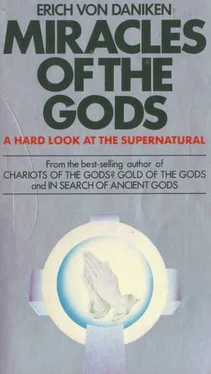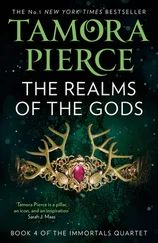Erich Daniken - Miracles of the Gods
Здесь есть возможность читать онлайн «Erich Daniken - Miracles of the Gods» весь текст электронной книги совершенно бесплатно (целиком полную версию без сокращений). В некоторых случаях можно слушать аудио, скачать через торрент в формате fb2 и присутствует краткое содержание. Жанр: Физика, на английском языке. Описание произведения, (предисловие) а так же отзывы посетителей доступны на портале библиотеки ЛибКат.
- Название:Miracles of the Gods
- Автор:
- Жанр:
- Год:неизвестен
- ISBN:нет данных
- Рейтинг книги:4 / 5. Голосов: 1
-
Избранное:Добавить в избранное
- Отзывы:
-
Ваша оценка:
- 80
- 1
- 2
- 3
- 4
- 5
Miracles of the Gods: краткое содержание, описание и аннотация
Предлагаем к чтению аннотацию, описание, краткое содержание или предисловие (зависит от того, что написал сам автор книги «Miracles of the Gods»). Если вы не нашли необходимую информацию о книге — напишите в комментариях, мы постараемся отыскать её.
Miracles of the Gods — читать онлайн бесплатно полную книгу (весь текст) целиком
Ниже представлен текст книги, разбитый по страницам. Система сохранения места последней прочитанной страницы, позволяет с удобством читать онлайн бесплатно книгу «Miracles of the Gods», без необходимости каждый раз заново искать на чём Вы остановились. Поставьте закладку, и сможете в любой момент перейти на страницу, на которой закончили чтение.
Интервал:
Закладка:
Suggestion and hypnosis (as a form of suggestion) are always present when miraculous cures take place at pilgrimage shrines, whether the Church admits it or not (and this applies equally to the
'genuine' miracles attested). Suggestion, to define it more accurately, is an influencing of the processes of thought, feeling and will, which 'leads to the uncritical acceptance of convictions, the suggestion of values and patterns of behaviour'. In the case of affective sympathy 'man involuntarily opens himself to
... phenomenal forms and ideas .... Mass situations, as well as states of heightened excitement of the aftects, have a strengthening effect. ... Autosuggestion is self influencing by emotional hope and wishful thinking.' What can hypnosis do? It can 'easily summon up illusions and hallucinations.
Memory is released. Most people can be hypnotized if they are inwardly prepared.'
These definitions are diagnoses of pilgrims at pilgrimage shrines.
What does the Church say about this?
It claims that 'the fact of the major miracle in the Catholic Church (must) be established beyond doubt to the unprejudiced investigator' [29]. I find this assessment by the Church to be inept, to say the least.
If in our age that is so overloaded with neurotic organic diseases and physically harmful states of depression, only 100 cures (even if they are not 'miracles') effected by suggestion, autosuggestion and mass hypnosis are reported annually from all the places of pilgrimage, the church's media - Madonnas, relics, springs, etc. - fulfil a useful miraculous purpose.
Miraculous cures have been known since time immemorial. Professor D. Langen [30] writes: Hypnosis as a psychic treatment of disease is extremely ancient and can be found both in the medicine of the ethnic cultures (shamans) and in the lofty civilizations of Egypt, Greece and Rome .... The trial was lost in the Middle Ages. ... Franz Anton Mesmer marked the beginning of a new period that led to the still valid suggestion theory of hypnosis by way of the theory of fluidum and magnetismus animalis.
... Thought is concentrated on a narrowly defined point so that a relation between a hyper-awake core of consciousness and the remaining lowered states of consciousness arises. While this state is maintained, thought is ordered to direct itself to a point or a complex of ideas and remain there. ...
Consequently meditation is thought concentrated on a point in a sub-waking state of consciousness.
By all the 12,000 saints! Cannot you see that all the masses at places of pilgrimage concentrate their gaze on a 'point' say a statue of the Madonna? How they fall into a hypnotic trance by autosuggestion?
Do you not feel in your bones how the general layer of consciousness sinks and simultaneously dwells on the miracle in a hyperactive state? Nearly every pilgrim has fallen into the power of mass suggestion from the start; should one of them remain outside it, he would be caught in the undertow of the state of consciousness of the others. 'Human individuals have an immediate effect on the Sensorium commune (common emotions).' [31]
These are not Mr. von Daniken's suppositions, but a logical chain of evidence forged by doctors as a result of research .... It is true that the Church also admits 'natural' explanations, but it reserves to itself the recognition of 'genuine' miraculous cures performed by visions, with the co-operation of the Holy Family and the halleluya singing choir.
Yogananda Paramahamsa [32] was one of the most famous Yogis of our day. The world-wide Self Realization Fellowship he founded in 1917 championed thoroughly sensible views which centre round one of the great Yogi's basic utterances: God helps those who help themselves. He has endowed you with will power and concentration, faith, reason and healthy commonsense so that you can help yourselves in all corporeal and mental suffering.
You must apply all your faculties at the same time as you call on him for help. When you pray or practise healing meditation, always say to yourselves that he needs your own, but God-given, powers in order to heal you or others. Yogananda knows psychology's laws of effect inside out.
We can never know in advance when we shall be cured and so should not set any time limits to the process. Faith and not time will determine when the cure is to take place. The end result depends on the correct awakening of the vital force and the conscious and unconscious disposition of the person concerned.
These insights of the Yogi's, to whom consecrated water (considered sacramental; it has a little salt mixed with it) is as alien as the joy of marriage still is to a Catholic priest, get to the very essence of miraculous cures, even though they stem from a totally unchristian faith, which is if anything a knowledge of the vital processes of auto suggestive cures. Yogananda gives his fellowmen a hint about how it is exercised at all the sites of visions and miracles: Do not forget that you must say the healing words with the right emphasis, loudly at first and then more and more softly until you are only whispering, that close attention and concentration are especially necessary. In this way you lead your thoughts, the truth of which you are deeply convinced of, from the aural sense into consciousness ... from there into the sub-conscious or automaticconscious.
He who has the necessary faith will be healed by this method.
I have never heard of Yogananda being at Lourdes or Fatima or any other visionary shrine, and I do not imagine he was. Yet his method is the one which is practised there. The crowds of people assemble in big squares, singing chorales in loud voices, saying the rosary or other devout prayers. The closer they get to the miraculous spot, the lower the volume of the droning chorus. Their attention and concentration is directed at the goal. What they wish for is forced 'from the aural sense into consciousness'. From then on they only speak in whispers and hymns are merely hummed. 'Faith' is wide-awake and concentrated.
In most cases this faith in the effect of the method of healing satisfies faith in miracles at visionary sites. In fact, the subconscious (or 'automatic conscious') introduces electrochemical functions into the brain. 'When the nerve impulses ... enter the brain, they set off various chemical reactions' (Campbell).
Clinical tests of new drugs have proved time and again that belief in the efficacy of a medicine can effect a cure. People are split into two control groups. One is given the new drug, the other a placebo (a harmless imitation of the new medicine, generally 'scented' sugar-coated pills of the same size and colour). Leslie M. LeCron describes the result: 'It is observed that a large part of the control group given the placebo reacts in exactly the same way as the group which has taken the real drug. This effect is attributable to suggestion.'
That which Yogananda Paramahamsa calls faith, will-power and concentration in connection with the healing effect, the doctor calls exactly what it is: suggestion. Yogi and doctor are far away from the highfalutin Christian talk about miracles but they know how 'miracles' happen.
It is the obstinacy, the partial blindness, I cannot understand. Theologians have still not clearly stated facts about 'miracles' that have been known for over 450 years.
Theophratus Bombastus von Hohenheim (1494-1541), known as Paracelsus, was the founder of a new science of healing. He emphasized the primacy of the 'soul' (today we would use the word 'psyche') in normal life and illness, and was the first to recognize the previously overlooked pathological connections and new types of illness, such as neuroses and psychoses. In the centre he placed man as microcosm. Healing to Paracelsus was the work of the life force and the will to live. Quotations from his treatise on Imaginatio [33] shows how modern his views were: Man is subject to imagination, and the imagination although invisible and inconceivable works corporeally in a substance.
Читать дальшеИнтервал:
Закладка:
Похожие книги на «Miracles of the Gods»
Представляем Вашему вниманию похожие книги на «Miracles of the Gods» списком для выбора. Мы отобрали схожую по названию и смыслу литературу в надежде предоставить читателям больше вариантов отыскать новые, интересные, ещё непрочитанные произведения.
Обсуждение, отзывы о книге «Miracles of the Gods» и просто собственные мнения читателей. Оставьте ваши комментарии, напишите, что Вы думаете о произведении, его смысле или главных героях. Укажите что конкретно понравилось, а что нет, и почему Вы так считаете.











